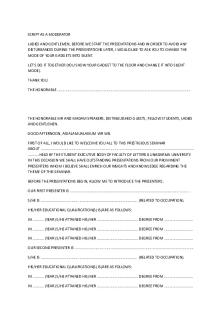Mediator versus Moderator variables PDF

| Title | Mediator versus Moderator variables |
|---|---|
| Author | Anonymous User |
| Course | Marketing |
| Institution | Cambridge Marketing College |
| Pages | 1 |
| File Size | 57.5 KB |
| File Type | |
| Total Downloads | 70 |
| Total Views | 144 |
Summary
Download Mediator versus Moderator variables PDF
Description
Mediator versus Moderator variables
Moderator variables - "In general terms, a moderator is a qualitative (e.g., sex, race, class) or quantitative (e.g., level of reward) variable that affects the direction and/or strength of the relation between an independent or predictor variable and a dependent or criterion variable. Specifically within a correlational analysis framework, a moderator is a third variable that affects the zeroorder correlation between two other variables. ... In the more familiar analysis of variance (ANOVA) terms, a basic moderator effect can be represented as an interaction between a focal independent variable and a factor that specifies the appropriate conditions for its operation. A moderator is a variable that affects the strength of the relation between the predictor and criterion variable. Moderators specify when a relation will hold. It can be qualitative (e.g., sex, race, class…) or quantitative (e.g., dosage or level of reward).
Mediator variables - "In general, a given variable may be said to function as a mediator to the extent that it accounts for the relation between the predictor and the criterion. Mediators explain how external physical events take on internal psychological significance. Whereas moderator variables specify when certain effects will hold, mediators speak to how or why such effects occur." A mediating variable explains the relation between the predictor and the criterion. It is often depicted as the following figure where MV is the mediator. A mediator can be a potential mechanism by which an independent variable can produce changes on a dependent variable. When you remove the effect of the mediator, the relation between independent and dependent variables may go away.
Another way to think about this issue is that a moderator variable is one that influences the strength of a relationship between two other variables, and a mediatorvariable is one that explains the relationship between the two other variables. As an example, let's consider the relation between social class (SES) and frequency of breast self-exams (BSE). Age might be a moderator variable, in that the relation between SES and BSE could be stronger for older women and less strong or nonexistent for younger women. Education might be a mediator variable in that it explains why there is a relation between SES and BSE. When you remove the effect of education, the relation between SES and BSE disappears....
Similar Free PDFs

Format Moderator Forum
- 3 Pages

Contoh Naskah Moderator Seminar
- 2 Pages

MEDIATOR PERSONALITY (INFP, -A/-T
- 19 Pages

Variables
- 5 Pages

Dunkin Donuts versus Starbucks
- 5 Pages

Poverty Point versus Cahokia
- 2 Pages

Erikson 5 versus
- 2 Pages

Nature Versus Nurture
- 2 Pages

Range versus Height
- 13 Pages
Popular Institutions
- Tinajero National High School - Annex
- Politeknik Caltex Riau
- Yokohama City University
- SGT University
- University of Al-Qadisiyah
- Divine Word College of Vigan
- Techniek College Rotterdam
- Universidade de Santiago
- Universiti Teknologi MARA Cawangan Johor Kampus Pasir Gudang
- Poltekkes Kemenkes Yogyakarta
- Baguio City National High School
- Colegio san marcos
- preparatoria uno
- Centro de Bachillerato Tecnológico Industrial y de Servicios No. 107
- Dalian Maritime University
- Quang Trung Secondary School
- Colegio Tecnológico en Informática
- Corporación Regional de Educación Superior
- Grupo CEDVA
- Dar Al Uloom University
- Centro de Estudios Preuniversitarios de la Universidad Nacional de Ingeniería
- 上智大学
- Aakash International School, Nuna Majara
- San Felipe Neri Catholic School
- Kang Chiao International School - New Taipei City
- Misamis Occidental National High School
- Institución Educativa Escuela Normal Juan Ladrilleros
- Kolehiyo ng Pantukan
- Batanes State College
- Instituto Continental
- Sekolah Menengah Kejuruan Kesehatan Kaltara (Tarakan)
- Colegio de La Inmaculada Concepcion - Cebu






